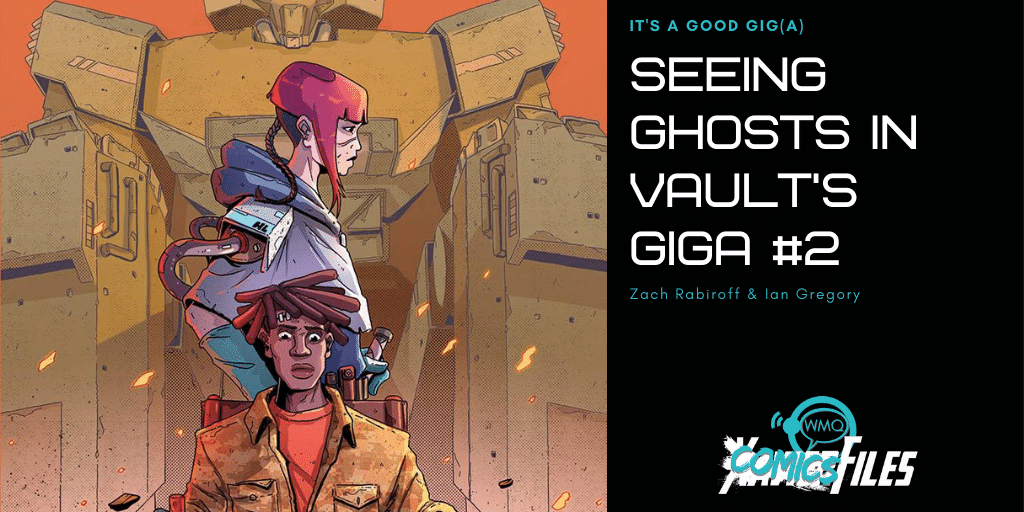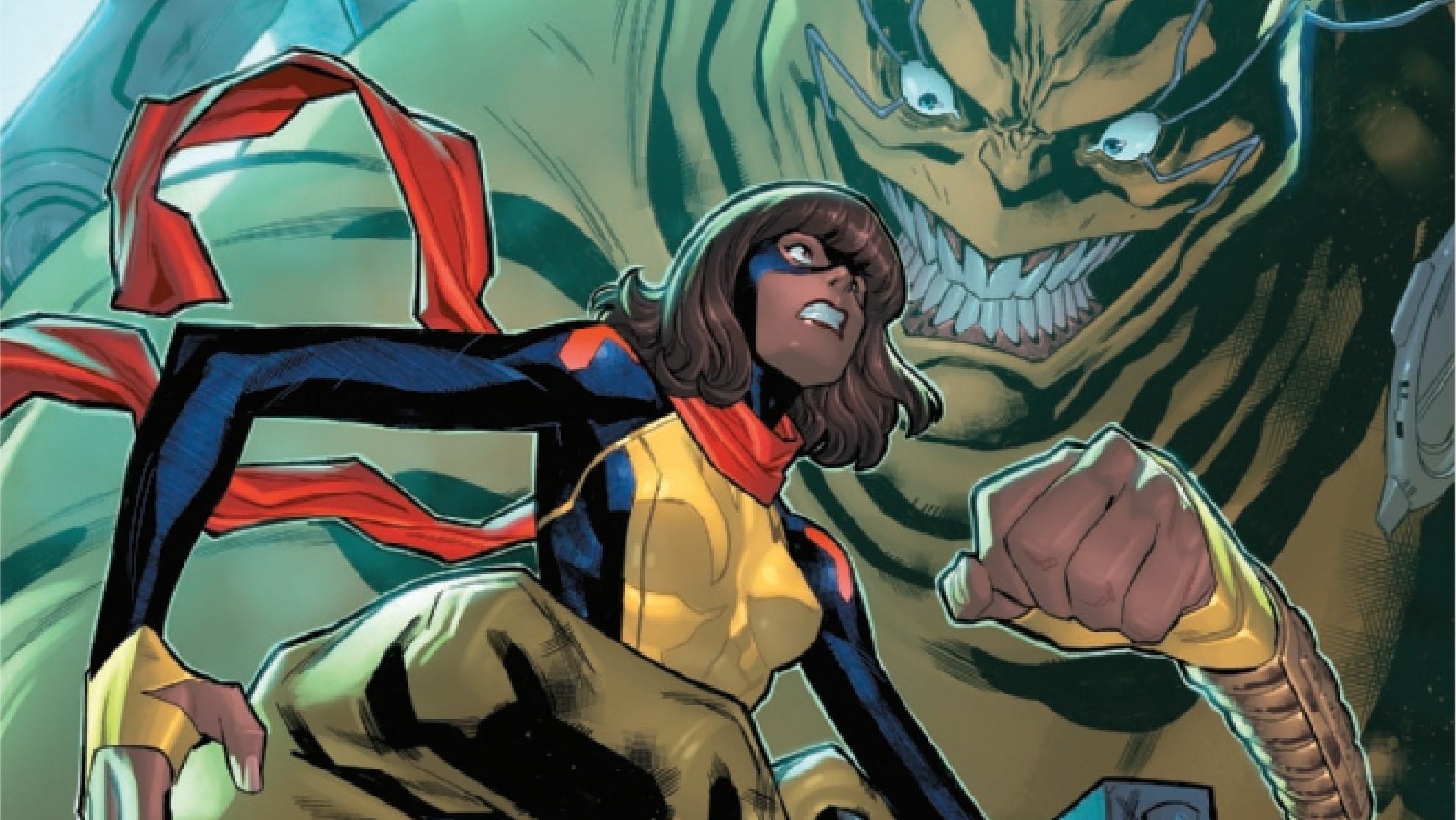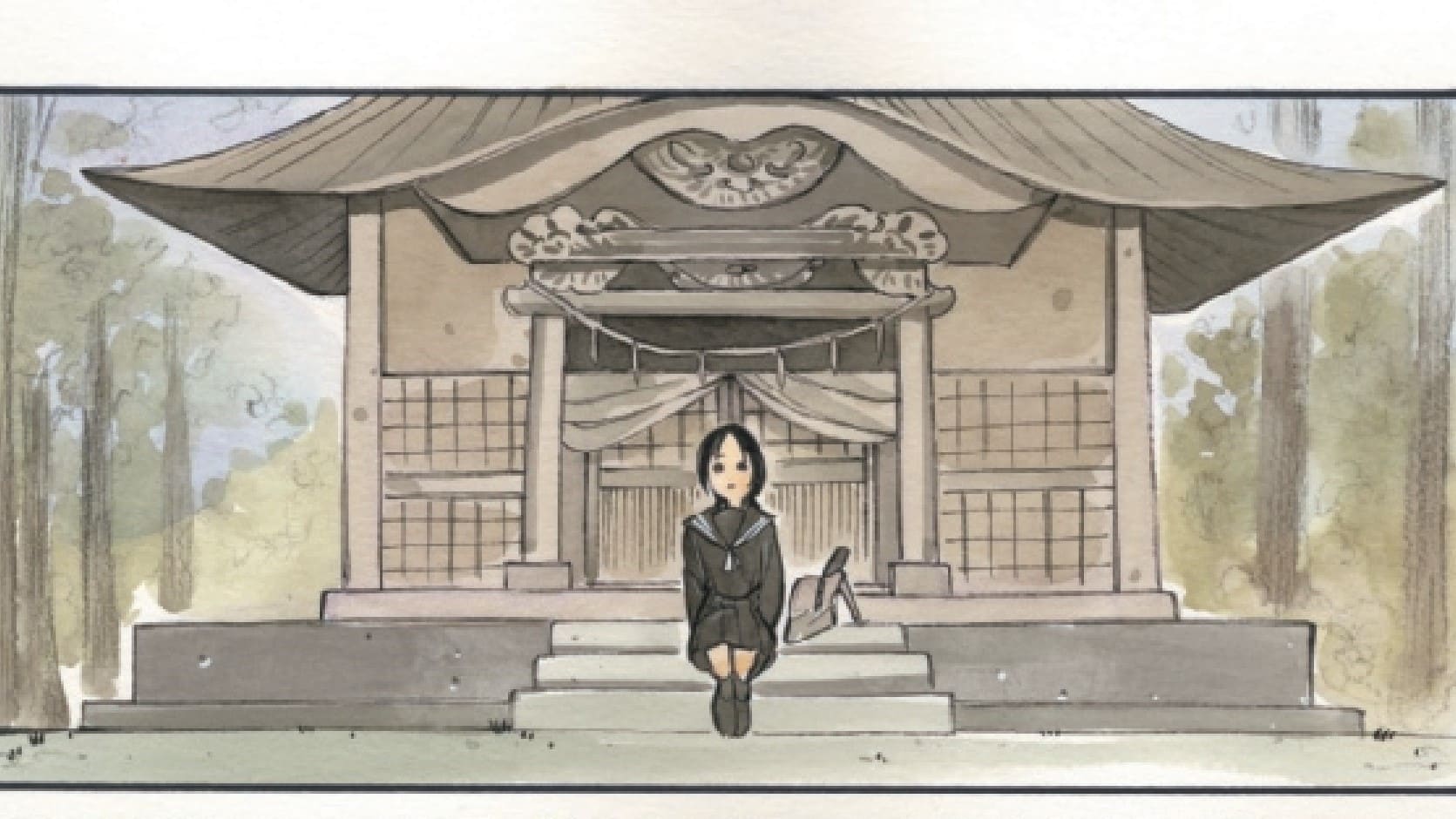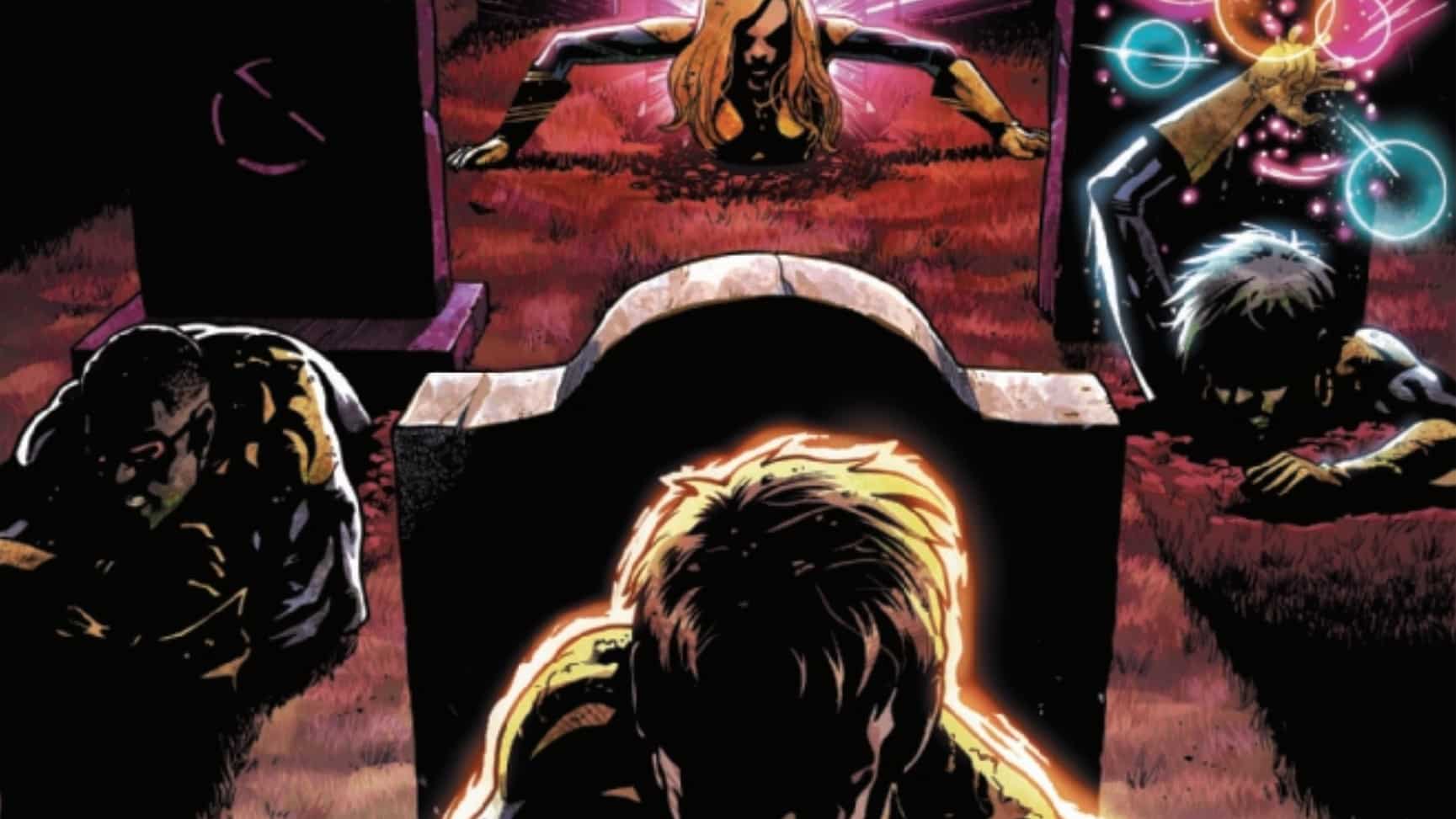Evan should never have gone back to the dead Giga, but he did, and now he’s a murder suspect. Meanwhile, Laurel is deteriorating at an alarming rate. The Red King — the oldest and largest of the Giga — is revealed, prophesied to unleash hell on a world whose sins the great mech took into itself centuries earlier. As an old friend of Evan’s returns, he devises a desperate plan to locate the dead Giga’s real killers. Let’s dive into Giga #2 by Alex Paknadel, John Le, Rosh and Aditya Bidikar.

Zach Rabiroff: It’s been a hell of a month since the last time we checked in with our heroes Evan and Laurel in the robot-littered world of Giga, as they were about to fall prey to a gang of Dusters while searching for something needed to repair Laurel’s broken mind. Frankly, it feels like we’ve been living through a robot apocalypse of our own, and I don’t even have an adorable robot companion to show for it. But I do have the second issue of this series, and I’m excited to get into the nitty gritty with you. Ready to dive back into this wonderful wasteland, Ian?
Ian Gregory: I’m so ready, Zach. I’ve been looking forward to this second issue, and it definitely delivers. There’s also a lot to talk about this week (I may be saying that every week of Giga, though), so let’s get right into it.
The Two Aikos

ZR: There are two ghosts that hover over this issue of Giga, and one of them isn’t dead. The second, the dead one, I’d like to get back to later. But first, let’s discuss what was, for me, the biggest surprise this time around: our two glimpses of Aiko, separated by time and who knows what else. If all we have known so far of Aiko are the scattered references to her from the first issue, her literal unveiling while plotting with the Dusters is a deliberate shock. The Aiko of today is a ruthless figure, willing to sacrifice the lives of her erstwhile allies without hesitation if it gets her closer to finding her lost device.
That “device,” is, I think, none other than our good friend Laurel, and that possibility brings us our first clue in unraveling the mystery of the rift between Aiko and Evan. What’s buried inside Laurel’s faltering neural circuitry, and why are both Evan and Aiko so desperate to get at it? All we can say for now is that Laurel is becoming an increasingly imperiled prize in a game of capture the flag, and it’s not clear what, if any, side she really wants to be on. (Of course, I could be entirely off base here, and Aiko’s device could be whatever material Evan was after to facilitate his repairs in the first place. But let’s entertain this theory for the sake of filling out our editor’s required word count, hmm?) [Grote’s note: I never gave them a word count.]
So the mystery of Laurel might hold the key to understanding Aiko’s role here, but so, too, might the gruesome accident we saw in the prologue that opened this series. But whatever the source of the fissure between Evan and Aiko, the woman we see here is a far cry from the insouciant, rebellious youth we meet in this issue’s opening segment. Indeed, speaking to the Dusters, she sometimes comes off like the leader of a cult of her own, speaking in epigrams that read like quotations from a book of wisdom: “when individuals see the truth of things, they cluster like mollusks on the shore.” On the other hand, she speaks in a definite plural about “our resources” and “our weapons,” and I don’t think this is merely a case of the royal “we.” Aiko has evidently joined with some third faction in this war (the wild Giga we learned about from Evan, perhaps?) — but what its relationship is to Evan, or Laurel, or the dead Giga under analysis in this issue, we have yet to discover.
IG: My reading on the device was different — I thought they were referring to the neural interface. Evan builds one in this issue for the church, and at the end, he picks an older version of it off the ground. I suspect that Aiko was using the neural interface to commune directly with the Giga — likely what she was trying to do in the very beginning of the first issue (Sub-theory: the neural interface she was using was the one Evan built for the prosthetic legs, and she took it and used it for that purpose, betraying his trust). If she hung on to that neural interface, she might be trying to get a direct line to the gods — and the Giga blew itself up, rather than tolerate “eavesdroppers” and “impurities.”
That the piece of paper she’s looking at appears to be from a Giga’s perspective suggests those are the thoughts her man was able to glean from its mind before having a total neurological breakdown (more on the implications of this later, I think). But it suggests she has some sort of purpose completely counter to the Dusters — that she wants to wake the Giga, to learn why they exist. What I’m interested in seeing is how Evan feels about this. Evan’s actual desires are a little murky; he clearly wants to protect and help Laurel, but why? What are his philosophical goals? In a series built around different groups of philosophies in conflict, Evan’s lack of commitment to any makes him a bit of a rogue agent.
ZR: In retrospect, your analysis is probably more on the money than my wild swing, though I suppose we’ll know for certain soon enough. One thing we can say is that, by comparison to the Aiko, the Dusters look even more sympathetic than they did before. We discussed last time how there isn’t quite a moral equivalency between the two sides in this battle: how the Dusters, for all their bellicosity, are ultimately rebels against the established government of the Order of the Red Relay, and how this alone positions them away from the role of antagonists in this story. If anything, that seems even more stark after the events in this episode. The Dusters aren’t good guys by any stretch — they are brutish, and bullying, and willfully ignorant in their violence. But the sight of those five prisoners dying before a cheering, lustful crowd for a crime that isn’t even their own is designed to elicit our compassion as readers. Reading the dialogue between the stoic father and daughter as they march toward the firing squad, I couldn’t help but think of the exchange between the princes Richard and Geoffrey from The Lion in Winter, as they prepare to meet death without giving their executioners the satisfaction of seeing their fear (“Chivalrous fool, what does it matter how a man falls?” “When the fall is all there is, it matters.”), but perhaps the more apt comparison would be of the Christian martyrs going before the lions in the Roman arena. The society of the Red Relay is barbaric in its craving for purgative violence against dissidents and heretics. It is a way for its leaders to redirect whatever anger might otherwise be directed against them. But then again, what faltering, religious, brokenly capitalistic society can cast that particular stone?
IG: There are no illusions of fairness in this justice system either. Mason says it himself: If we decide you’re guilty, you are, regardless of anything else (not to mention their transparent attempts at witness intimidation). Though Saber comes out of the Giga claiming the Dusters killed it, that doesn’t seem to be the truth to me (based on my theories earlier). It’s much easier to say the Dusters killed a Giga than reckon with the idea that the Giga are so disinterested in humanity they’d blow themselves up to avoid dealing with them. The cruel and arbitrary nature of the Dusters’ execution really lands in this issue — the stark contrast between the people in the crowd cheering and drinking and the really intense final page of the firing squad is particularly effective.
At this point, we’re sympathetic to the Dusters, but I’m expecting some sort of reprisal with their new weapons when they discover their people have already been executed. That’s what makes Evan’s ideological neutrality so interesting — he’s still respectful of many of his old religious beliefs but also flaunts them when he chooses. Ultimately, the side he’s on is his own, and Laurel’s, but we’ll see how long he can make it on his own if open war breaks out in the city. I suspect he may have to make some hard choices to get Laurel the parts he needs to fix her breaking brain.
You Gotta Have Faith
ZR: A world away from Aiko is the figure of Father Crowquill — a surprisingly fascinating character, all things considered (and with a magnificently Dickensian name, to boot). Both visually and in his spoken manner, he evokes a 16th century Catholic cardinal: the kind of religious leader so comfortably ensconced in the corruption of his church that he no longer even registers the threat of its overthrow, let alone the injustices and inequities that maintain its existence, and certainly not the possibility that its theological underpinnings are anything less than true and unchanging.
And that last point is key, I think, because for all his arrogance, Crowquill betrays a genuine, almost childlike belief in his theology. He’s willing to twist it and manipulate it, to be sure: such are merely the prerogatives of power, and not an altogether far cry from Aiko’s sardonic “no heresy among the initiated” line earlier in the issue. But we first see him vainly struggling to understand the irregularities he has detected in the Book of the Assembly in a way that reveals a legitimate vulnerability, and a worry that the root of his faith is coming into question. I don’t think he’s prepared to live in the world that would create, and not only because it would be a world that no longer had need of him or his fellow theocrats. So the plan he unleashes to terrible effect in this issue is born not just of power but of fear. And perhaps even of a real desire to understand the truth.
And while we’re on the subject of truth and righteousness, it seems that Evan is caught in something of a moral crossroads of his own. Whatever the source of Evan’s fall from grace as one of the initiated, he’s not an out-and-out enemy the way Aiko is. Indeed, it may well be that what separates him from the authorities isn’t so much political opposition as a very personal need: namely, his devotion and cross-species affection for Laurel. Even if the repair of Laurel’s cognitive functions serves a more strategic purpose than we yet know, it’s impossible to deny an emotional bond between the two characters. Laurel’s poignant fear as she feels her mind slipping away (a la the final moments of HAL 9000) is echoed by some powerfully emotive art from John Le — two hands meeting in the rain in a gesture of loyalty and dedication that transcends governmental allegiance. However strange the circumstances, this is a love story. And it’s hard not to feel a mounting sense that it cannot possibly have a happy ending.
IG: What a lovely touch, that Crowquill is called “Your Accuracy.” Engineering and mechanics seem to be built into their faith, as we see in that verse as Evan builds the neural interface. But how interesting that neuromancy is banned by the church, as it clearly leads to something the religions’ creators sought to avoid (and it seems we do have definite “creators,” as the Book of Assembly is not just a book but a specific contraption of some kind, with a clear inventor). Were they afraid that, with neuromancy, mankind would recreate the Giga, and unleash them back on the world? Did they want to avoid people communing directly with the Giga? Crowquill’s disregard for this tenant suggests he doesn’t know why neuromancy is banned either — he isn’t inducted into some great secret of the order, no hidden directive known only to the elite.
A dead Giga suggests such a theological quandry to Crowquill that he’s perfectly willing to ignore the laws of his faith to solve it. It’s an easy trap to fall into, when writing a massive organized religion, to have the leaders of that religion be completely cynical and working only for personal gain or for greed (this is a very common trope in fantasy manga). I like that Crowquill does seem to believe in the Book of Assembly, but he also believes in himself enough to ignore the Book when he’s confronted with a serious problem. I like that the stakes are ideologically high enough for the Order to move them to action in this way.
The Mind of a God

ZR: And then there is the other ghost stalking this issue, looming and massive, and utterly alien to our human sensibilities. The corpse of the fallen giga, physically and metaphorically, is sprawled across this comic, though who he was and what his death means remain as much a mystery to us as to the Order of the Red Relay. And the attempt of the humans to penetrate its mind by way of Evan’s interface does little to illuminate things — though it does provide an opportunity for Le’s most stunning set piece of the issue, a violent, expressionistic illustration of the wreckage of a man’s mind as he tries to read the mind of a robotic god. It’s as vivid a demonstration as we could imagine of the allegory set up an issue ago, of homo sapiens as beneficent bacteria servicing the bodily functions of the Giga. And like any other bacterial organism, the moment we penetrate too far below the skin’s surface, we must be purged and expelled.
But who are these gods, and what brought about their fall? Even the scripture that Father Crowquill quotes about the Red King only opens up greater mysteries. The church assigns the Giga his role in the mythological narrative (“not evil incarnate — merely its vessel”), but even as he does, the art works as an ironic counterpoint to his certainty: the camera pulling farther and farther back to reveal the priests sheltered within the belly of the dead machine, themselves the “torrent of depravity and unreason” ready to burst forth like an abscess from the Red King’s skin. And what, after all, is the Book of the Assembly? It’s a remarkably clever name, a play on words that suggests a very literal repair manual refashioned into a book of holy scripture: a bit like the famous To Serve Man episode of The Twilight Zone, I suppose. But how far we can trust the words of the priesthood to represent the truth are, as ever, up to us to judge.
IG: I love the note that Aiko gets from Kevan. It reveals a lot about that particular Giga: that it was “the hand of the Red King,” which suggests the Giga at least partially self-identify in the way that the Book of Assembly describes them. It means isn’t a totally post-hoc religion, but one based on the realities of the past. It means the Order isn’t completely based on a pack of lies, and that there must be some truth to their beliefs. The note also tells us why this Giga chooses to wander and not settle down in the city like the others: It resents the idea of becoming a “plowshares” and cannot forget its past as a warrior.
I like this delineation between the Giga, showing us they have different priorities and beliefs and histories. It also means this wandering Giga was at least somewhat awake but has no desire to war with or destroy mankind. Do Giga only acknowledge other Giga as lifeforms worth competing with? Would the reawakening of the Red King lead to all the other Giga rising up to fight as well? That sounds like a fairly apocalyptic scenario, if they are all as indifferent to human life as this Giga seems to be.
Aiko’s lines are cryptic, of course, but I love her saying she’ll have a “clear line of sight on heaven.” Why seek to destroy the Giga? We have yet to see a real reason they could be bad for mankind, aside from the Order’s use of them as religious figures (and the maybe nonexistent threat of them waking up and causing havoc). The actual history and nature of the Giga is really alluring as well, because we know the Order has at least part of the truth, which I find more interesting than some twist that completely upends every preconceived notion they have.
ZR: A side note here, by the way, about robot gender. We learn in this issue (contra to our own writing in last month’s column) that Laurel accepts the feminine pronoun. Or, at least, that’s what Evan insists on, though the authorities of the Order scoff at the notion. This at least appears to be true of the Red King, if the traditionally gendered implications of that title are to be taken as evidence. There is at least a suggestion here that robotic people either take on human gender norms, or (perhaps more likely?) have those norms assigned to them to make their ineffable personalities a little more graspable by the humans around them. Or, perhaps, I’m drawing too broad a conclusion here. Perhaps Laurel’s identification has something to do with her still-mysterious association with Aiko. Either way, there’s quite a lot to chew on here with regard to the agency and independence of mechanical souls, and it brings us back to a distinction you pointed to last month about how, properly speaking, these really aren’t mecha at all if they aren’t controlled by humans in the cockpit. The Giga certainly don’t seem to be controlled now, but were they ever? Are they truly a race of gods created outside biological society, or are they simply a kind of hyper-evolved Ford Fiesta that no longer need licensed drivers?
I seem to be filled with questions this month, but that’s all for the good. This series continues to be absolutely gripping in both the world it’s building and the characters it’s establishing. Two issues in, I have great faith that these questions are going to be, if not answered resolutely, then at least used as a springboard to open up questions even more intriguing than the ones we’ve recognized so far. At this point, I’m trusting enough to let these creators thrive in the unsettling ambiguity.
IG: Absolutely. I once again had to check the number of pages on this week’s issue — just 25! I feel like enough happened and enough questions were raised for two issues or more. Not only do we get a lot of character work, worldbuilding and plot development, but Paknadel gave Le plenty of room to breathe and deliver on some really outstanding splash pages. It’s really difficult to keep the reader engaged through a lot of time changes, perspective switches and plot, but I had no issues keeping up. A lot of my questions from last week were answered, but a lot of new questions were raised — we’ve made progress without losing any excitement or wonder from this world.







